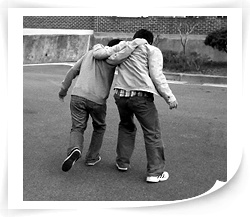Initiation
Chapter three reminded me of what my parents used to say when I was young, “Keep yourself clean wherever you go.” And I realized how there could be various meanings even in a simple statement as above. Before I read this chapter, I always thought of this statement simply as a way my parents used to keep me clean. However, after I finished reading chapter three, I realized everything can be viewed critically. In other words, I realized that in this chapter, washing not only represented the physical cleanness, but it also may represent other things, such as dignity and propriety.
Primo Levi, in this chapter, described the mental state of the prisoners. All the prisoners in the camps were in constant tensions. The tension rooted both from emotional and physical factors. Emotionally, they were always worried about their lives because anyone could be put into gas chambers in any day. Additionally, everyday work gave them a physical pain. Not only that, but they were also treated badly that they weren’t called by their names; rather, they were given numbers. Furthermore, the unsanitary environment was notorious that washing became a futile job for prisoners because it would only take energy for prisoners. Primo Levi’s position toward washing was also same, he believed washing oneself was just a waste of energy because they would eventually get dirty by the next day, thus, and there was no point in washing himself up. However, Steinlauf washed himself everyday. Steinlauf’s view was “not because the regulation states it, but for dignify and propriety.”
His action, in fact, suggested that he will not abide by rules of Nazi and he will stand up against them. In other words, the physical part of keeping sanitary lost its values, but the moral value still held its values. Primo Levi was so concentrated on his physical part that he did not understand why he had to wash himself if he were to get dirty again. But later, after he looked himself back, realized it symbolized sense of pride and everything. After reading this chapter, I became more critical in viewing things, even the simplest thing that I do everyday, like washing could mean a lot.
Tuesday, February 27, 2007
Subscribe to:
Post Comments (Atom)

No comments:
Post a Comment